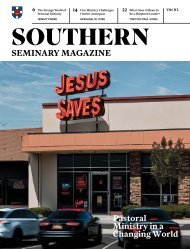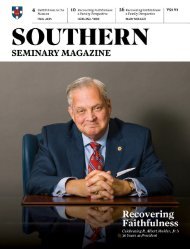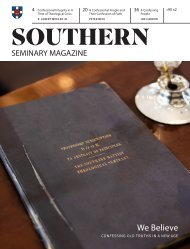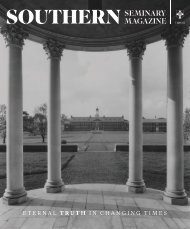Southern Seminary Magazine (Vol 90.1) The Light of Truth: Apologetics in the 21st Century
You also want an ePaper? Increase the reach of your titles
YUMPU automatically turns print PDFs into web optimized ePapers that Google loves.
<strong>the</strong> chang<strong>in</strong>g face <strong>of</strong> apologetics <strong>in</strong> a secular age<br />
“If <strong>the</strong> world around us is<br />
seculariz<strong>in</strong>g, <strong>the</strong>n <strong>the</strong> church<br />
must self-consciously practice<br />
apologetics as a mode <strong>of</strong> existence.”<br />
its b<strong>in</strong>d<strong>in</strong>g authority. I’ve lived long enough to watch it<br />
happen, and it still surprises me.<br />
Accord<strong>in</strong>g to Canadian philosopher Charles Taylor,<br />
this fall<strong>in</strong>g <strong>of</strong>f <strong>of</strong> religious faith and practice will become<br />
so much a part <strong>of</strong> <strong>the</strong> cultural landscape that no one will<br />
notice what is miss<strong>in</strong>g. It’s an age, Taylor said, with<strong>in</strong><br />
which <strong>the</strong>re’s no longer any need for <strong>the</strong> society to be<br />
grounded <strong>in</strong> belief <strong>in</strong> God or <strong>in</strong> any ultimate reality.<br />
Human be<strong>in</strong>gs just are, and society requires no explanation<br />
beyond itself. Government just is, and you may<br />
argue about which government should be <strong>in</strong> place, but<br />
no one is mak<strong>in</strong>g any arguments about transcendence or<br />
<strong>the</strong>ism. As Taylor said, “In our secular societies, you can<br />
engage fully <strong>in</strong> politics without ever encounter<strong>in</strong>g God.”<br />
In fact, Taylor argued that a secular age is one <strong>in</strong> which<br />
people engage all goods that are a part <strong>of</strong> human flourish<strong>in</strong>g<br />
apart from any sort <strong>of</strong> <strong>the</strong>ological reference. In<br />
our day and time, human flourish<strong>in</strong>g has become an end<br />
<strong>in</strong> itself. In fact, <strong>the</strong> government’s only reason for existence<br />
<strong>in</strong> a secular era is to enhance <strong>the</strong> current society’s<br />
understand<strong>in</strong>g <strong>of</strong> <strong>the</strong> common good. If it succeeds at<br />
that, government is understood as hav<strong>in</strong>g achieved its<br />
purpose. If it fails, <strong>the</strong>n throw <strong>the</strong> crooks out and get<br />
a new government.<br />
In <strong>the</strong> secular age, what Taylor calls <strong>the</strong> social imag<strong>in</strong>ary—<strong>the</strong><br />
sum total <strong>of</strong> <strong>the</strong> ideas that are imag<strong>in</strong>able by<br />
people <strong>in</strong> a particular social epic—no longer <strong>in</strong>cludes<br />
<strong>the</strong>ological truth claims at all. <strong>The</strong> world is different now<br />
precisely because it’s miss<strong>in</strong>g what had characterized<br />
<strong>the</strong> world before.<br />
Three Observations about<br />
<strong>Apologetics</strong> <strong>in</strong> Our Chang<strong>in</strong>g Culture<br />
How are we to th<strong>in</strong>k <strong>of</strong> <strong>the</strong> task <strong>of</strong> apologetics <strong>in</strong> this new<br />
era? How does a Christian defend <strong>the</strong>ir faith <strong>in</strong> a secular<br />
age? I want to make three observations:<br />
1<br />
First, if <strong>the</strong> world around us is seculariz<strong>in</strong>g, <strong>the</strong>n <strong>the</strong><br />
church must self-consciously practice apologetics as a<br />
mode <strong>of</strong> existence. When I was a young Christian read<strong>in</strong>g<br />
apologists like Francis Schaeffer, I didn’t th<strong>in</strong>k <strong>of</strong><br />
apologetics as <strong>the</strong> Christian mode <strong>of</strong> existence or even as<br />
a necessary part <strong>of</strong> <strong>the</strong> Christian way <strong>of</strong> life, but I did feel<br />
like it was a necessary part <strong>of</strong> m<strong>in</strong>e. I largely saw apologetics<br />
as a Christian method for answer<strong>in</strong>g specific sorts<br />
<strong>of</strong> questions. And once those questions were answered,<br />
you moved on from apologetics to someth<strong>in</strong>g like systematic<br />
<strong>the</strong>ology.<br />
That understand<strong>in</strong>g <strong>of</strong> apologetics wasn’t unique to<br />
me. <strong>The</strong> Anglican <strong>the</strong>ologian Aust<strong>in</strong> Farrer (1904–1968)<br />
lived a short life—just sixty-four years—but it was one<br />
that saw dramatic changes. When Farrer was born <strong>in</strong><br />
1904, four European countries had jurisdiction over<br />
more than a third <strong>of</strong> <strong>the</strong> earth’s surface. It was a world<br />
<strong>in</strong> which most people <strong>in</strong> most lands were governed by<br />
crowned heads. But all <strong>of</strong> that, especially <strong>in</strong> <strong>the</strong> European<br />
context, came to an end. Various empires, <strong>in</strong>clud<strong>in</strong>g <strong>the</strong><br />
Habsburg empire <strong>of</strong> Austria-Hungary and <strong>the</strong> Romanov<br />
empire <strong>of</strong> Russia, all ended by <strong>the</strong> time Aust<strong>in</strong> Farrer was<br />
ready for grade school.<br />
Farrer’s lifespan, which spanned from just after <strong>the</strong><br />
time <strong>of</strong> Victoria until <strong>the</strong> modern age, <strong>in</strong>cluded two<br />
world wars and a pr<strong>of</strong>ound transformation <strong>of</strong> British life.<br />
He saw governments that ranged from <strong>the</strong> High Tory<br />
tradition to socialism by <strong>the</strong> time <strong>the</strong> Labor Party was<br />
<strong>in</strong> power. <strong>The</strong> world that Aust<strong>in</strong> Farrer knew at <strong>the</strong> end<br />
<strong>of</strong> his life was a fundamentally different world than what<br />
he had known <strong>in</strong> <strong>the</strong> beg<strong>in</strong>n<strong>in</strong>g. But to him, <strong>the</strong> biggest<br />
change was <strong>the</strong>ological.<br />
Farrer called what was tak<strong>in</strong>g place <strong>in</strong> Brita<strong>in</strong> <strong>the</strong><br />
6 <strong>the</strong> sou<strong>the</strong>rn baptist <strong>the</strong>ological sem<strong>in</strong>ary






